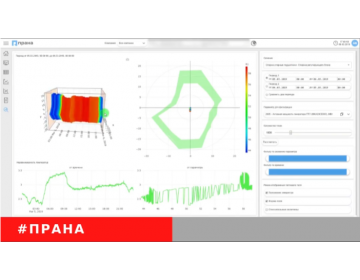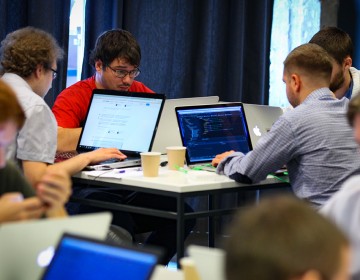Distance Working: How Companies are Transferring their Employees to Quarantine because of Coronavirus
With the spread of the coronavirus epidemic, many employers are moving their employees to remote work. Those who are not yet ready for this move must comply with government instructions, which include cancelling mass gatherings and monitoring the health of employees. Top managers and owners of Russian companies tell us how they are managing to go on working in these new conditions without reducing the efficiency of their processes.
Mikhail Lifshitz, Chairman of the Board of Directors and co-owner of ROTEC JSC
Remote work is one of the effective solutions being used globally today to slow the spread of coronavirus. Cloud solutions make it possible to minimize the risk of employee infection without sacrificing labor productivity.
A year ago, we introduced a distributed expert community function to our hardware and software complex, PRANA, which allows us to predict faults in industrial equipment connected to it. Gathering professional experts on different types of equipment which can be connected to the system – gas and steam turbines, generators, boilers, transformers and so on – in one place, is an expensive process both in terms of resources and time. Therefore, we have developed this distributed solution which gives experts complete access to the system’s analytics and predictions, to the raw data about the operational parameters and mnemonic diagrams of the equipment, and to the secure communication channels between the Situational Center and connected sites.
Today, all of this has allowed our personnel to switch to distributed work without the slightest loss in efficiency. The solution that we have devised as a way of improving the economic efficiency of using the system for our customers (with the possibility of connecting their own experts) has also turned out to be, at the very least, one the most effective ways for the company’s technical department to keep functioning in an emergency, such as the current coronavirus pandemic.
Aleksei Avdeev, CEO and partner of Calltouch end-to-end analytics and call tracking service
We have introduced flexible attendance for all our employees. Those who can are working from home. However, there are people who are more comfortable in an office environment. Lots of people say that there are too many temptations at home, such as lying on the couch or watching a series, whereas in the office they are much more productive. At the same time, all our employees feel safe because we have taken every precaution to prevent the spread of infection.
Firstly, we have canceled all events (and we have a lot of them) until April 21 We hope that by this time the situation will be much better and we will be able to return to our normal rhythm.
Secondly, at the start of the day, all employees have their temperature taken and if it is high they are sent home. Furthermore, every effort has been made to ensure personal hygiene: disinfectant is available at the entrance to the building, in every office and in the common areas, floors and surfaces are constantly being cleaned and the rooms are aired.
We have sent out letters with instructions on how to stay safe and what to do if you start to show symptoms of the disease. If an employee is not feeling well, they should stay at home and call a doctor. This is a simple requirement of common sense which we try to observe not only now, but at all times.
Otherwise, the epidemic has not affected the life of the company. We are working intensively, looking to the future with optimism and trying to cheer up our colleagues with little treats; for example, when the outbreak began, we increased the amount of fresh fruit and other vitamins in the office.
Alexander Gornik, CEO of Mindbox marketing automation platform
Our company is keeping a close eye on the latest news about the pandemic. We introduced free attendance in advance and asked all our employees who had visited high-risk countries to self-isolate.
In the office, we are taking employees’ temperatures, we have sanitizers, and what’s more, we are disinfecting surfaces. On Monday we recommended that employees only come to the office if they really need to. If an employee decides to come to the office, we pay their parking or taxi fare. We have also canceled all processes and meetings which require a large number of people in one room. All necessary interviews have been moved online.
The main instruction that we are giving our employees is to assess any risks to their own health (we provide information and articles from reliable sources) and to decide for themselves how to act. The company’s priority is our health and the health of our families, but the management are also asking that the interests of the business be taken into consideration and that damage be minimized in the current processes. To do this, we provide all the infrastructure for remote work.
Since we also do not control office visits in general, we already had most of the necessary technical capabilities for remote work. Slack, Zoom, Trello and Google Docs are our usual working tools. Employees also use MacBooks or wireless headsets. The usual daily rituals, such as briefings on the whiteboards, were successfully conducted online on the very first day. All decisions made in the current situation are based on the company’s values – evolution (smooth change) and self-management. Thanks to shared motivation (we have open P&L and 30% of our income is shared out among our employees) we can rely on the common sense and self-organization of every employee. For example, employees have already independently decided to reduce purchases of perishable food for the office, which allows us to cover some unforeseen costs.
Svetlana Anisimova, General Director of UiPath in Russia and the CIS
We are complying with recommendations to control the coronavirus epidemic, so the UiPath team in Russia has already started to work remotely. For us, this transition has been painless – many of the company’s processes have been digitalized for a long time. We still have personal meetings with clients, but we take safety precautions. We will have to abandon these if stricter rules are applied. Meetings are, of course, important, but their temporary cancellation is not critical for the company.
It’s not difficult to work remotely today – there are a lot of convenient tools and services, starting with general messengers and ending with smart RPA systems for automating business processes. They help manage the team, track the completion of tasks, monitor work processes and automatically process data.
At UiPath, we develop robots which help to take away excess work from personnel and entrust routine tasks to algorithms. For example, our Beijing office was the first to use a bot to monitor health during the coronavirus epidemic. The system reminds employees to fill in a form every day, and then analyzes this data and draws up graphs of the results. This is convenient for HR specialists and it allows them to stay up to speed without spending a lot of time.
In general, remote work is not a radical step today. Of course, minor problems arise but this is normal. Just ten years ago, the effects of a global quarantine would have had much more dramatic consequences. Today, companies are more flexible. They understand that remote work is the new norm. OwlLabs recently conducted a survey and found that 56% of businesses already allowed employees to work remotely. Moreover, 16% of respondents are in fully distributed teams. So, this is a global trend that will obviously continue to grow after the epidemic.
Natalya Komarova, HR Director of Orange Business Services in Russia and the CIS
The management of our company has recommended all employees to switch to remote work from 18 March. We all understand that the less employees come into direct contact with one another, the fewer will be infected and unable to work. This means that labor efficiency in the company can be maintained at the same level.
Not all employees can work remotely due to the nature of their activities, but our clients need their support, and we are obliged to guarantee the necessary level of quality of our services. We take the temperatures of these employees with a non-contact thermometer, and a doctor visits the office once per week. In the same way, we check the temperature of visitors to the office. Everyone has been understanding about this.
Of course, we have limited travel abroad. First of all, all business trips to high-risk countries have been canceled. If, however, someone does return from one of these countries (from a vacation, for example), they must observe quarantine for two weeks from the date of return. It is important to follow all quarantine rules, not to visit public places and to minimize the use of transport.
We have also limited travel within the country at least until April. If the purpose of a journey is critical and it cannot be canceled or delayed, a minimal number of employees will go on the trip. All interviews and most meetings have been moved online, and we are trying to do the same with our meetings with clients.
Employees who are working remotely retain their professional responsibilities. The working day is 8 hours with a lunch break – nothing has changed here. Working tools are corporate laptops and desktop PCs, corporate software and messengers, plus Skype. Our technical support team remains on hand to deal with any technical malfunctions.
A specially created project team is constantly in touch with one another and with employees. Official meetings are held online twice per week. Regular communication is carried out between all staff and managers. The HR department is always on hand for consultations, and organizes webinars on working with remote teams. There are a lot of questions as not all employees were prepared to work remotely from home.
We are confident that the measures we have taken will allow us to maintain high business results and overall labor efficiency, and we will make every effort to ensure this.
Source: VC.RU
The PRANA Predictive Analytics and Remote Monitoring System has received another update of the operating system.
The industrial holding ROTEC JSC and Group-IB, one of the leading developers of solutions for detecting and preventing cyberattacks have entered into a cooperation agreement to ensure technological and cybersecurity of critical infrastructure facilities. The agreement was signed at the International Industrial Trade Fair Innoprom 2021 and will allow ACS and IS specialists of enterprises to observe and take proactive measures to prevent incidents caused both by service wear of equipment and as a result of cyberattacks.
The industrial Internet begins with the introduction of systems based on mutual penetration of information technologies and automation devices of manufacturing equipment, such as the systems of remote monitoring and diagnostics. One of the inspection methods of the equipment’s condition is its continuous monitoring, which is a necessary condition for the transition to a service system on the operating condition
According to Mikhail Lifshitz, Chairman of the Board of Directors of ROTEC, Russian power engineering company, the venture capital market in its present state is currently raising people whose aim is not to create a winning product, but just to raise funds. With regard to his business, Mr. Lifshitz abandoned the speculative component and headed for the long-term integration of ideas into production.
Despite the hazy weather and pouring rain, the yachtsmen were in a terrific mood! Three crews of racing yachts in Olympic Class SB20, mainly represented by employees of ROTEC, PRANA and TEEMP, took the whole winners podium in the amateur competition. For most of the participants, it was their first-ever experience of this kind – and they claimed victory straight away!
The trend towards digitalization and flourishing of the service economy have led to the emergence of a new model – Maintenance-as-a-Service. Let’s explore how it’s organized and the benefits that it offers to business.
The Internet of Things (IoT) integrates devices into a computer network and allows them to collect, analyze, process and transmit data to other facilities via software, applications or technical devices















